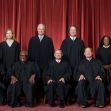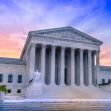Justice Elena Kagan passionately advocated for an enforceable code of conduct for U.S. Supreme Court justices, stressing the urgency of the issue. She argued that the current system, which relies on justices to self-regulate, lacks necessary enforcement mechanisms. Speaking at a judicial conference on Thursday, Justice Kagan emphasized that enforceable rules are essential to maintain public confidence and integrity in the nation's highest court.
Kagan suggested that an external committee of respected lower-court judges, appointed by the Chief Justice, could oversee compliance and determine appropriate sanctions for any ethical violations. This proposal comes in the wake of recent controversies involving Supreme Court justices, notably Justice Clarence Thomas, who accepted luxury vacations from a wealthy Republican donor, and Justice Samuel Alito, who displayed flags associated with the January 6, 2021, attack on the U.S. Capitol at his homes. While the justices have denied wrongdoing and claimed compliance with existing ethical guidelines, these incidents have sparked bipartisan calls for stronger ethical oversight.
Kagan stressed that an enforceable code of conduct would not only hold justices accountable for any misconduct but also protect those who have acted appropriately. "Sometimes people accuse us of misconduct where we haven’t engaged in misconduct," she noted. An independent oversight body, she argued, would help clarify and enforce ethical standards, thereby enhancing the court's reputation and public trust.
The idea of an enforceable code has gained traction among Democrats, including President Biden, who have advocated for legislation to impose such rules on the justices. Unlike the Supreme Court, lower federal courts and nearly all state courts are subject to enforceable ethical standards. The absence of such a code for the Supreme Court has drawn criticism, particularly as the court's decisions continue to shape significant aspects of American life and governance.
In her remarks, Justice Kagan also expressed concern over the court's current direction, particularly in its recent term, when the conservative majority issued rulings that significantly curtailed federal regulatory power. She cautioned against using individual cases to push broader ideological agendas, highlighting the 6-3 decision in Loper Bright Enterprises v. Raimondo, which overturned the long-standing Chevron deference doctrine. This doctrine allowed federal agencies to interpret ambiguous laws, granting them significant regulatory power.
Kagan's comments reflect a growing concern among legal scholars and practitioners about the Supreme Court's role in American governance. As debates over judicial ethics and the court's influence continue, the question of how to ensure accountability and integrity at the highest level of the judiciary remains a pressing issue.






